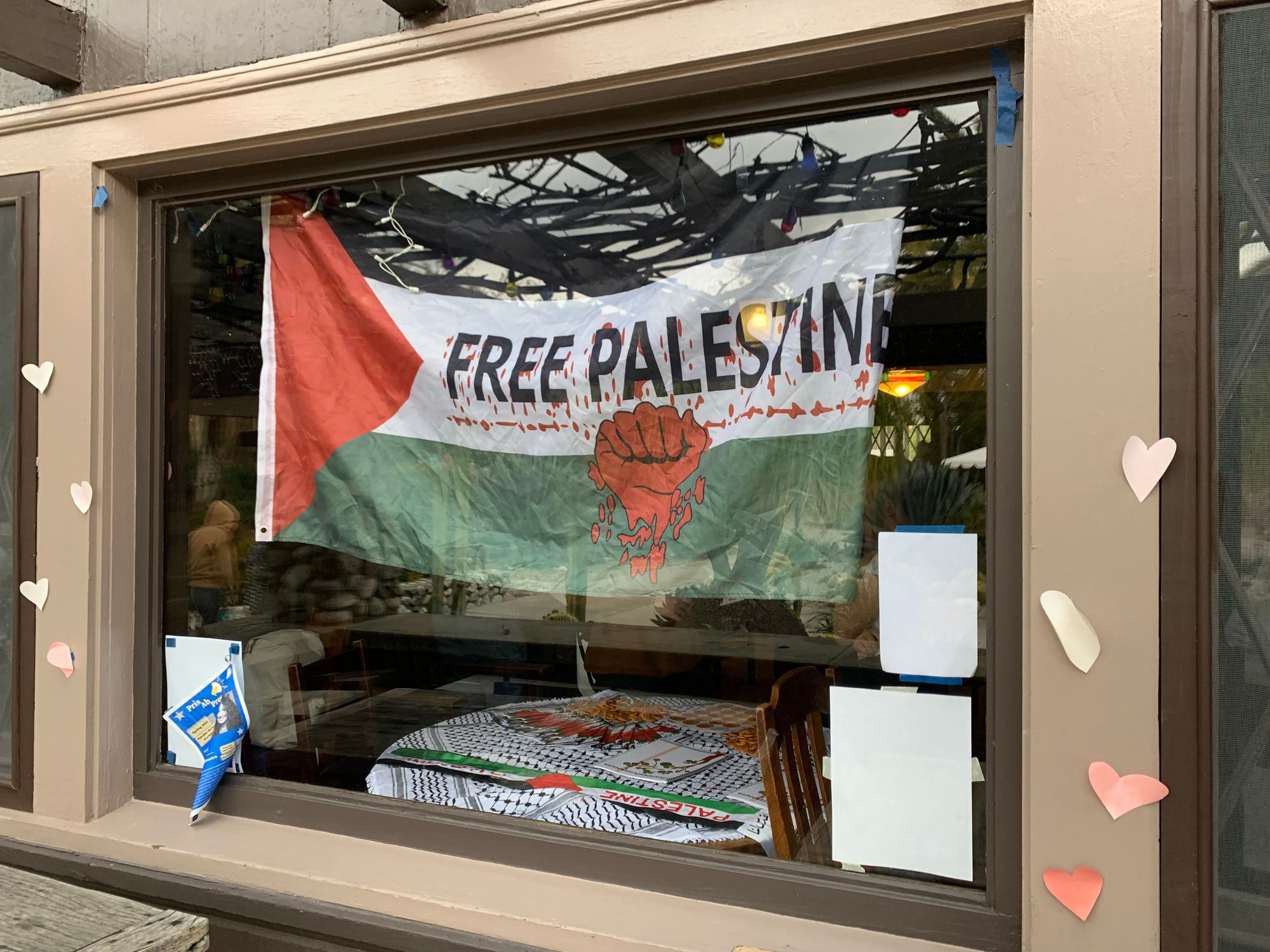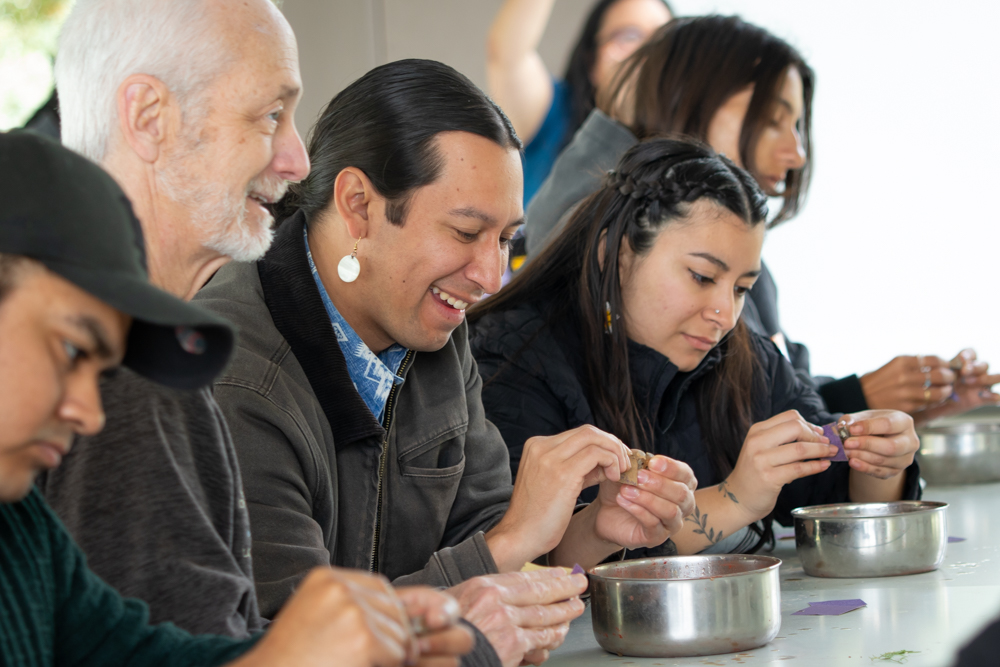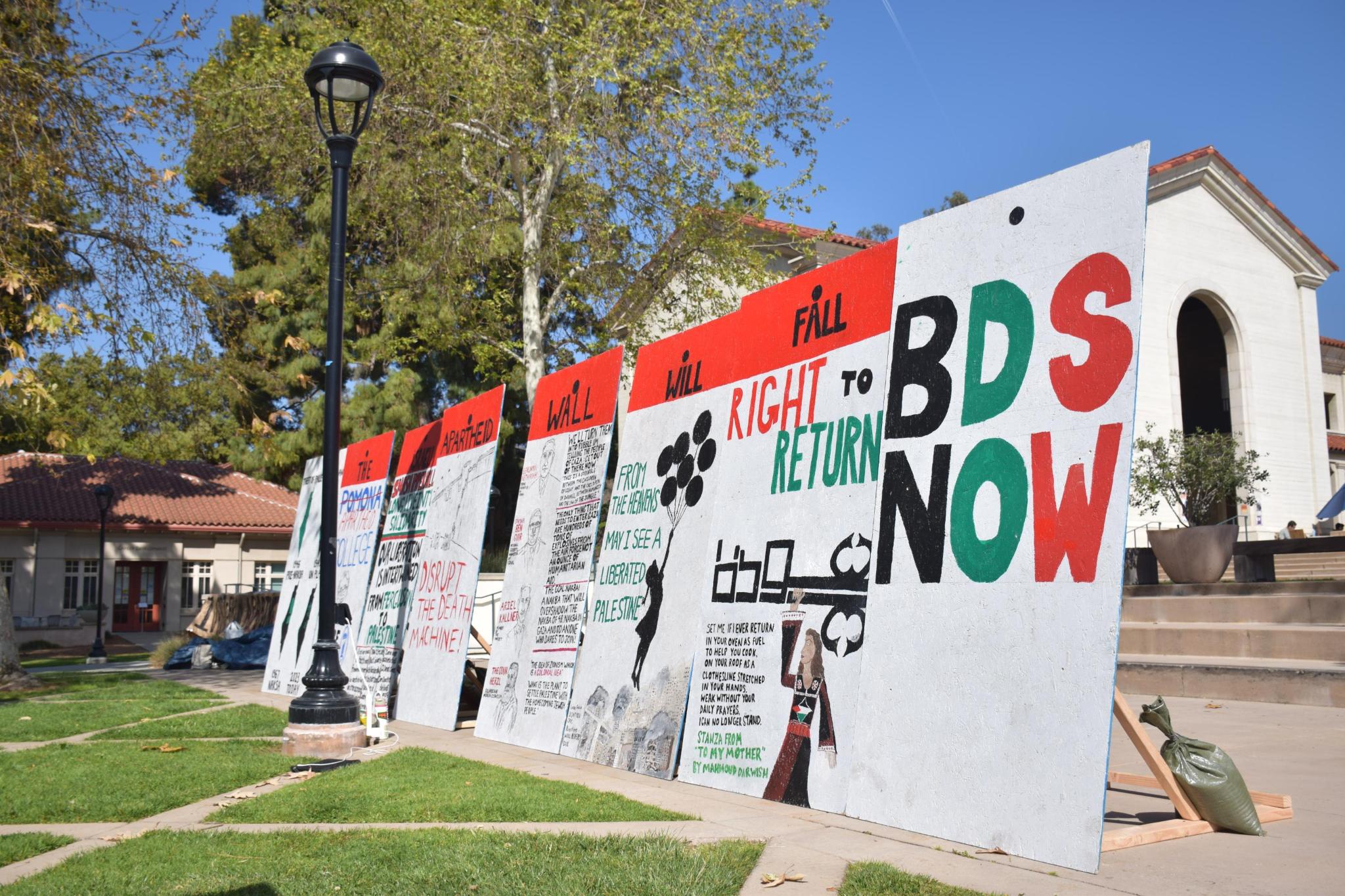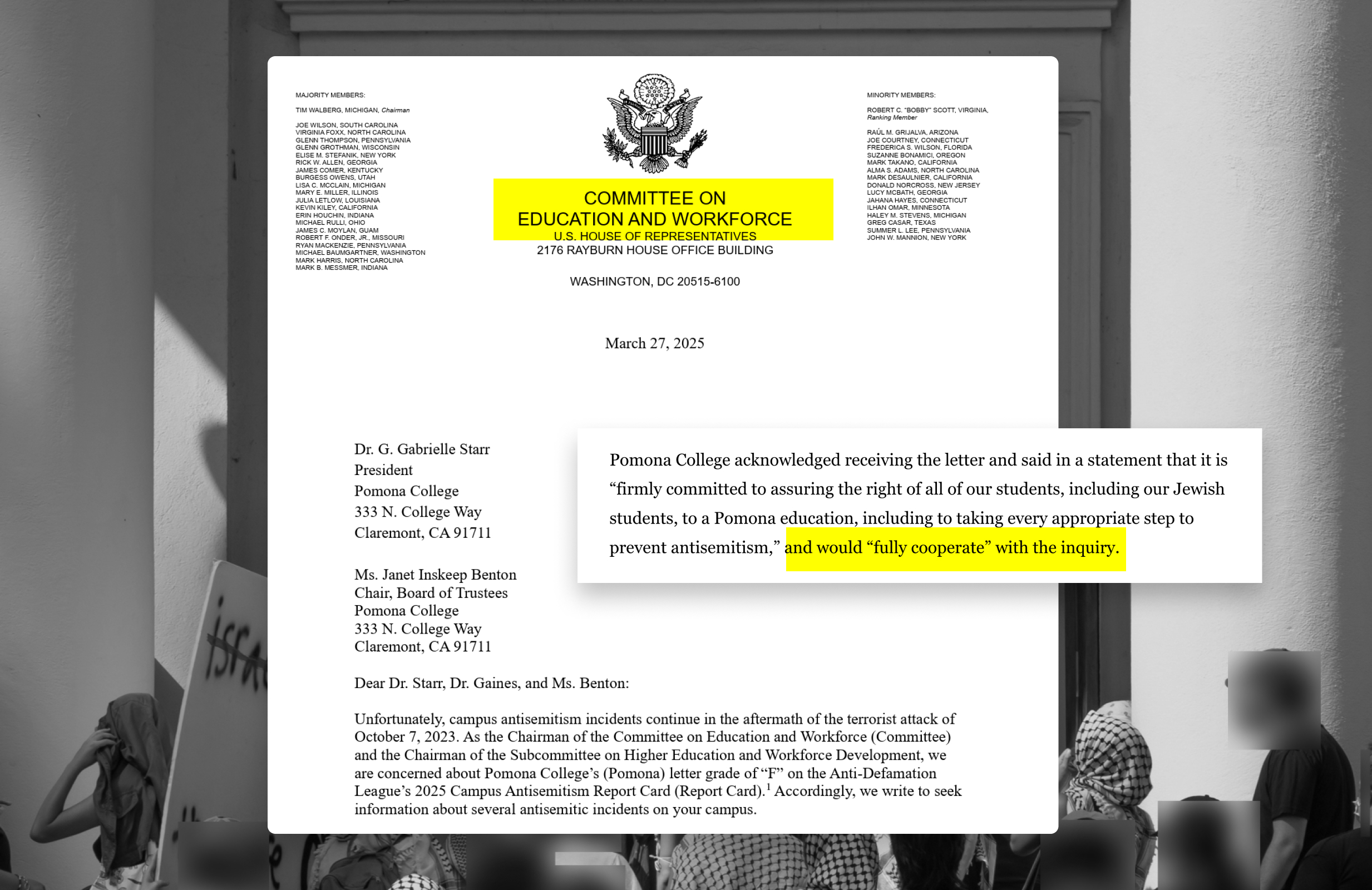
April 3, 2023
Organizers say program supports violent displacement of Palestinians — “My family is from Haifa, my dad was born in Haifa…but I would not be able to go there on study abroad.”

Claremont Students for Justice in Palestine launched a campaign Thursday for Pitzer College to suspend its study abroad program at the University of Haifa in Israel.
The university houses Israel’s military colleges and elite training programs that sustain the state’s continuing violent displacement of Palestinians. In Haifa alone, over 40,000 Palestinians were displaced from their homes in 1947-48, while legal structures today make it difficult for members of the Palestinian diaspora — including some Claremont students — from even entering the area.
Lue, a Claremont SJP organizer from Haifa who chose not to disclose his last name out of safety concerns, said that he would be unable to attend the program if he wanted to.
“My family is from Haifa, my dad was born in Haifa, and his passport says he was born in Haifa, Israel, but I would not be able to go there on study abroad,” he told The Undercurrents. “When I was nine, I tried to visit my aunt who was dying. I got detained for eight hours, and they held an AK-47 to my head.”
The University of Haifa has also been accused of discriminating against Arab students through scholarship allocation and has censored speech and academic work critical of Israeli occupation.
“The University’s long history of inflicting violence on Palestinians and discriminating against non-Jewish students renders Pitzer’s study abroad program unethical and unfair,” SJP said in a campaign statement.

A historic campaign
The event relaunches an SJP campaign from 2018-19, in which the Pitzer College Council – consisting of faculty, staff, and students – overwhelmingly passed a resolution suspending the Haifa program until (a) Israel ends its discriminatory restrictions on entry based on ancestry and/or political speech and (b) Israel adopts policies granting study abroad visas for exchanges to Palestinian universities on a fully equal basis as it does to Israeli universities.
A few hours after the 2019 vote, then Pitzer President Melvin Oliver vetoed the resolution — the second of only two vetoes in Pitzer’s history, both against pro-Palestine resolutions — and flew to the University of Haifa to reinforce Pitzer’s support for the exchange.
Oliver resigned in 2022, prompting SJP to relaunch the campaign. Organizers hope that incoming President Strom Thacker PO ‘88, who fought for Pomona to divest from apartheid South Africa as a student, will be more supportive.
With over 40 students crowded into Pitzer’s Grove House, the event began with a screening of Palestinian activist Mohammed el-Kurd recounting the history of Land Day, when Palestinians successfully resisted an attempted Israeli confiscation of Palestinian land for Israeli settlement in 1976. Leading up to a planned general strike, the Israeli military raided multiple villages in a violent crackdown, wounding 50 Palestinians, arresting 300 and killing six, el-Kurd said.
But “despite the violent crackdown, or perhaps because of it, the strike was carried out successfully, and the repression which was meant to deter nationalist sentiment instead ignited an anti-colonial mood so magnetic it connected the fragmented realities of Palestinians everywhere,” he says.
Israeli occupation is “not just something that happened in 1948 or 1967,” said SJP organizer Miriam Farah CMC ’23 at the event. “It’s ongoing, and that’s why it’s very urgent for us to launch these campaigns in order to really attack the institution’s connections to the state of Israel.”
The campaign’s success would be a historic moment for the academic front of the Boycott, Divestment, and Sanctions (BDS) movement. Launched in 2005, BDS seeks to end international support for Israel’s occupation and human rights violations of Palestinians. “When this gets passed, Pitzer [will] be the first institution of higher education to have successfully legislated an academic boycott against the state of Israel,” SJP organizer Carrie Zaremba PO ‘23 said. “From there, it will be a domino effect.”
Organizers in occupied Palestine, affiliated with the Palestinian Campaign for the Academic and Cultural Boycott of Israel, have been supporting the Pitzer Suspend Haifa campaign since its initial launch in 2018. Having shared the news of the relaunch with a few of these organizers earlier that morning, Pitzer Professor Dan Segal added that they expressed “great appreciation” and “enthusiasm” for Claremont students’ solidarity.
After the launch presentation, students gathered at the Pitzer Free Wall to paint messages announcing the Suspend Haifa campaign.

Academic freedom for whom?
Defenders of Pitzer’s partnership with the University of Haifa, including Melvin Oliver, have argued that suspending the program would restrict “academic freedom.” But “the University of Haifa is hardly a bastion of academic freedom,” Zaremba said.
“Palestinian as well as Jewish Israeli scholars who tried to produce academic work condemning the Israeli apartheid state and the occupation will [most likely] be removed,” she said. “There’s been really high profile academics who have had to leave the university just for acknowledging the [displacement of Palestinians in 1948].”
SJP’s campaign statement highlights the case of a master’s student who was denied their degree after presenting a thesis on a 1948 Israeli massacre of Palestinians, despite faculty in the student’s department grading the research well.
The question comes down to “freedom for who,” Lue said.
“While [Oliver is] saying that this is a breach of academic freedom, it’s a breach of students of a specific privilege’s freedom to go, whereas by the propagation of this study abroad, we are enforcing the taking away of rights of other people,” he said. “It becomes this question of whose rights matter to the school, whose freedom matters.”
“Open people’s eyes” through solidarity
For now, campaign actions will be limited to outreach and a petition, with calls for another College Council vote and further actions to come once Thacker takes office in the fall. In the meantime, SJP organizers urged students to educate their peers and professors about Israeli apartheid and combat misinformation from U.S. media.
“Please talk to Pitzer students, students on [the Student Senate and College Council], faculty, because they will all have a say in this vote,” Lue said. To combat misinformation, “first-person narrative is the best. Find Palestinians in your community or even online and support them. A lot of art is coming out of Palestine right now….do your best to educate yourself and those around you.”
Organizers at the event mentioned that progress on building solidarity with Palestinians has been made in the past few years. Recalling speaker Vijay Prashad PO ‘89’s emphasis that “language matters” in his Monday talk, organizers discussed how the label of Palestinian occupation as “apartheid” moved from the fringe to the mainstream in recent years, with Amnesty International and Human Rights Watch both declaring Israel an apartheid state last year.
Showing solidarity can continue to “open people’s eyes to the fact that there is something going on,” Lue said.
“[It took] years for America to realize that what we did with the Native American genocide is terrible. It’s gonna take time for people to learn [about Israeli apartheid], but that doesn’t mean you should ever give up on speaking the truth, speaking your advocacy and showing solidarity with [Palestinian] people,” he said.
The campaign launch comes in the middle of SJP’s “Palestine Freedom Weeks,” with programming including a keynote address by Marxist historian Vijay Prashad, an event co-organized with the 5C Prison Abolition Collective featuring organizers from the Stop LAPD Spying Coalition, and a screening of the Palestinian film Farha (2021).
SJP called on the campaign’s supporters to sign and share their petition, talk to faculty and students about supporting the campaign, and join SJP. More information can be found on the campaign’s website, and via SJP’s Instagram @claremontsjp.


Affinity groups

Palestine

Palestine

Undercurrents reports on labor, Palestine liberation, prison abolition and other community organizing at and around the Claremont Colleges.

Issue 1 / Spring 2023
Setting the Standard
How Pomona workers won a historic $25 minimum wage; a new union in Claremont; Tony Hoang on organizing
Read issue 1